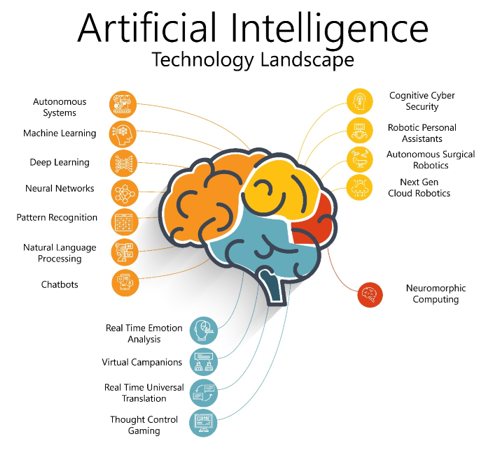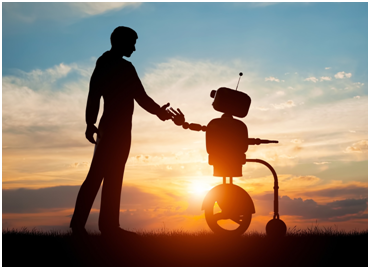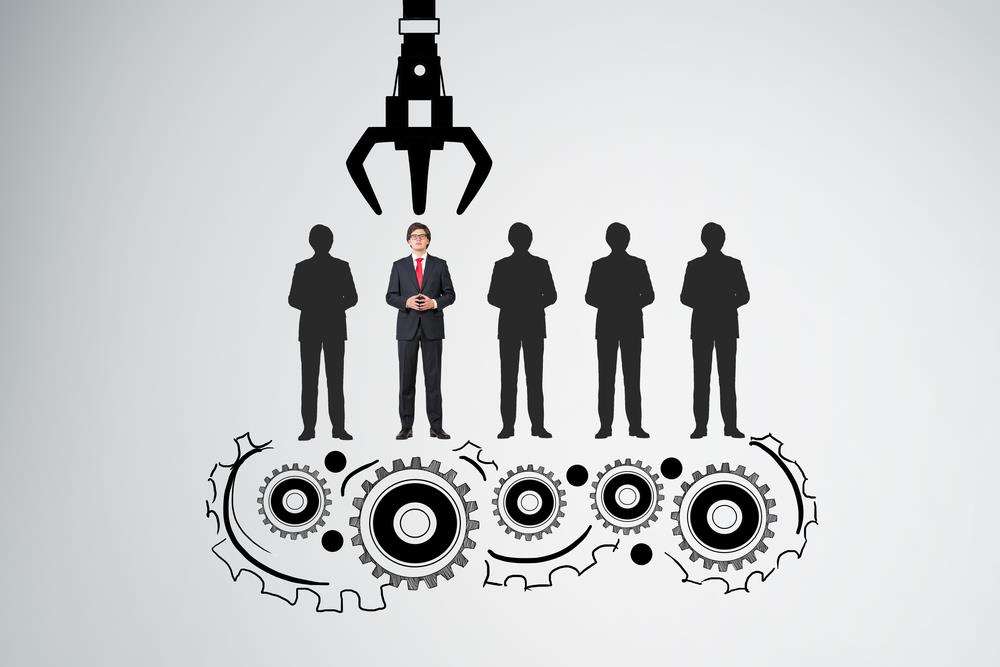“AI is probably the most important thing humanity has ever worked on.” – Sundar Pichai.
One of the biggest things we ponder about on AI through all these years of development has been: “Is AI ready for prime time?”
From being just a figment of our imagination to becoming a part of our everyday life, artificial intelligence has changed the way we live. With AI transforming and augmenting us, becoming more intelligent every second, it has grown in its stature from being associated with only robots a few decades ago to positively impacting every sphere of our life.
This spans across everything from how we work, travel and shop, to the way we obtain news and information, get entertained, to how we enjoy the gadgets at our homes. It’s also having a very significant influence on human relationships, how we converse, consume information and express ourselves. AI is also being integrated into business to provide better customer experience, drive operational efficiency, and optimise productivity.
The current pandemic has further pushed the digital transformation agenda for most enterprise with AI being in the forefront to aid this journey.

Real World Artificial Intelligence Applications
1. Customer Experience and Relationship Management
Customer Experience and Relationship Management are evolving on a day to day basis, in every sphere. AI has an increasing role to play with the CX (Customer experience) and CRM (Relationship) management.
Fueled by the availability and ability to capture and collaborate data with analytics and Insights, AI has revolutionized the end user experience by understanding the user behavior, ability to engage the user by comprehending their choices and at the same time empowering enterprises to better understand and proactively work with their most critical asset i.e. the Customer.
Amazon, Netflix and Spotify have built their product offers through personalization and content optimization. For enhancing CX, AI uses the data collected from user profiles and demographic, and data that customers publish on the web. AI offers the apt selection and range of offers to suit customers in near real time. Similarly, AI provides insights to the organization for proactive customer engagement and, while augmenting the employees to aid operational efficiency.
By the end of the year, AI will handle about 85% of all the customer interactions. (Gartner)
2. Banking & Finance
AI has changed the game when it comes to banking and finance in various front, with security, customer experience and omnichannel enablement, being the major accelerators in these sectors. Adaption of AI enabled tools like conversational bots, digital process automation in the backend processing, fraud management, and credit scoring are just a few of many AI’s important contributions to the sector.
Banking is the second largest industry implementing AI solutions. It’s planning to spend $5.6 billion by 2022. (Fintech)
As per the Autonomous Next research, the aggregate potential cost savings for banks from AI applications is estimated to reach $447 billion by 2023.
3. Healthcare
AI through robotics, virtual assistants, Patient Analytics and Computer Aided Diagnosis has improved patient care and helped save lives while saving time and money.
Cambio Health Care developed a clinical decision support system for stroke prevention that can give the doctors a warning when there is a patient at risk of having a heart stroke.
With the current COVID-19 pandemic, that has created tremendous chaos around the world, affecting people’s lives and causing a large grievances, AI has been a resourceful tool to help the medical workforce as a support system to fight against it.
Some of the ways in which AI is supporting health care sector is through early diagnosis using medical images, digital analysis of viral genomes and find virus origin, track physiological and genetic changes. Real-time spread tracking, surveillance, early warning, and alerts for geographical locations for viral diseases.
Chatbots and AI enabled applications are also playing a significant role to manage infrastructure, patient monitoring and tracking applications to consult patients and communities, to act as the supporting digital workforce.
4. Agriculture
AI is a relatively new concept when it comes to agriculture.
Drones are being used to produce 3-D field map of detailed terrain, drainage, soil viability and irrigation before crop cycle.
In agriculture storage, drying, grading of harvested crops are very important aspects. Monitoring and quality control mechanisms of agricultural products have improved drastically with artificial intelligence techniques like Automation and Sensors like TEAPEST.
AI is also helping us better utilize and understand the usage of scarce natural resources like water and soil. For instance, there are initiatives to automate the watering of farms based on crop, soil type and weather condition and at the same time normalize the usage of energy leading to huge savings and crop efficiency across the board.
AI is also being implemented to efficiently minimize the potential chances of crop losses due to change in weather.
5. Edutech
Due to COVID scenario, e-learning needs has been boosted tremendously. This calls for digitally enabled and transformed way on how the learnings are effectively imparted, monitored, and managed.
A new way of learning is through AI enabled Personalized Learning and Monitoring or Chatbot enabled Natural Language Driven Assistant, with Personalized on-demand content.
Mass-scale Grading and Assessment,Proctoring, AI enabled evaluation, and auto-grading like short answer grading techniques are some other contributions of AI in the field of education.
E-learning through the mobile app with AR/VR is also going to play a significant role in coming years with more and more emphasis on “education anywhere” and “practical Intelligence”. AI will play a major role in personalizing content and learning experiences for students.
AI adoption in education will explode over the next five years and is expected to reach global expenditure of $6 billion by 2025. (HolonIQ)
6. Retail
Retail and consumer products organizations are entering a new phase of technological innovation – with AI at its core.
Brands and retailers are already adopting AI-powered intelligent automation at a breath-taking pace, and that process is only going to accelerate. Over 80 percent of executives in both the retail and consumer products industries expect their companies to be using automation by 2021.
Nearly two-thirds of retailers (62 percent) are investing in Big data automation and 43 percent in predictive analytics.
With the help of AI, businesses generate and use a great deal of data – individual sales, customer histories, fashion trend, financial data on the cost, etc. All this data, current and historical, can be put to use to deliver functional business insights and help in decision making, reduce time to market new products and services, and improve success rates of initiatives.
Omni-channel retailing is a popular strategy in a new retailing era when AI, Digitalization, Social Media, Big Data and other emerging technologies like Virtual Reality (VR), Augmented Reality (AR), Blockchain, etc. are transforming the retail business models.
7. Logistics
In this era of drastic changes in the logistics industry, unmanned sorting centres, unmanned aerial vehicles delivering goods and logistics warehouses have emerged one after another. Many logistics companies around the world are transitioning to analytics, automation, hardware and software robotics, and mobile computing.
In a Forbes Insights Research, 65% of senior transportation focused executives believe that logistics, supply chain and transportation processes are in midst of a radical transformation. In the same report, nearly 2/3rd of the respondents also anticipated that systems that integrate Artificial Intelligence (AI) and Machine Learning (ML) result in significant productivity benefits. (Forbes)
Amazon fulfilment centres are busy places, with packages and employees moving around constantly. Robots assist Amazon’s warehouse operation and conveyer belts that shuttle bins and pallets around to be packaged together, labelled, shipped, and delivered with impeccable precision. Robots pick up heavy items to prepare them for shipping or storage. AI helps us monitor the merchandise, people and machinery and helps in workforce optimization leading to better deliveries and reduced operation costs.
8. Manufacturing
The manufacturing sector is a perfect fit for the application of artificial intelligence. Along with the Industry 4.0 revolution, we are already witnessing significant benefits from AI. As part of the digital thread, AI would help to close the loop from production to consumption by stitching activities from designing and production floor, to the supply chain and administration and customer engagement. From managing the product quality, to demand forecasting, to performance management of all ecosystem partners AI has changed the way we manufacture and consume products.
Collaborative robotic arms can learn the motion and path demonstrated by human operators and perform the same task. AI also automates the process that used to require human participation like maintenance.
Cloud-based machine learning is allowing manufacturers to streamline communication between branches. Data collected on the assembly line is often interpreted and shared with other units to automate- material provisions, maintenance, and other previously manual undertakings. McKinsey predicts that ‘smart factories will drive $37 trillion in new value by 2025.
In a recent survey on artificial intelligence, 44% of respondents from the manufacturing sector classified AI as “highly important” to the manufacturing function in the next five years, while almost half—49%—said it was “absolutely critical to success.” (McKinsey)
This is only the beginning, and artificial networks and big data will continue to thrive and open limitless possibilities. With AI making inroads in several fields, businesses has made incredible progress to improvise the operational efficiency and augmenting human efforts. Other sectors like travel and gaming, space exploration, education, defence have also seen massive growth in the use of AI over the last decade as enterprises have started to appreciate the business benefits with the adoption of AI and hence their hunger and velocity to accelerate the adoption of AI. Without a doubt, AI is here to stay and prosper!


is a Senior Vice President at the Analytics Centre of Excellence, at happiest minds. Ajay holds a Master of Engineering degree (E&C) from BITS Palani, Rajasthan and is a speaker at various Industry forums. He has 22 plus years of experience in the Technology Industry, he spearheads this group for leadership around Artificial Intelligence, Data Science, Big Data and Data Engineering among other innovations. On the Technology front Ajay is experienced in building world class products and solutions for emerging areas such as IoT, Analytics, Connected ecosystem, Cloud, Video, Networking etc. He has managed large cross-functional teams for successful delivery and deployment of global award-winning products.






